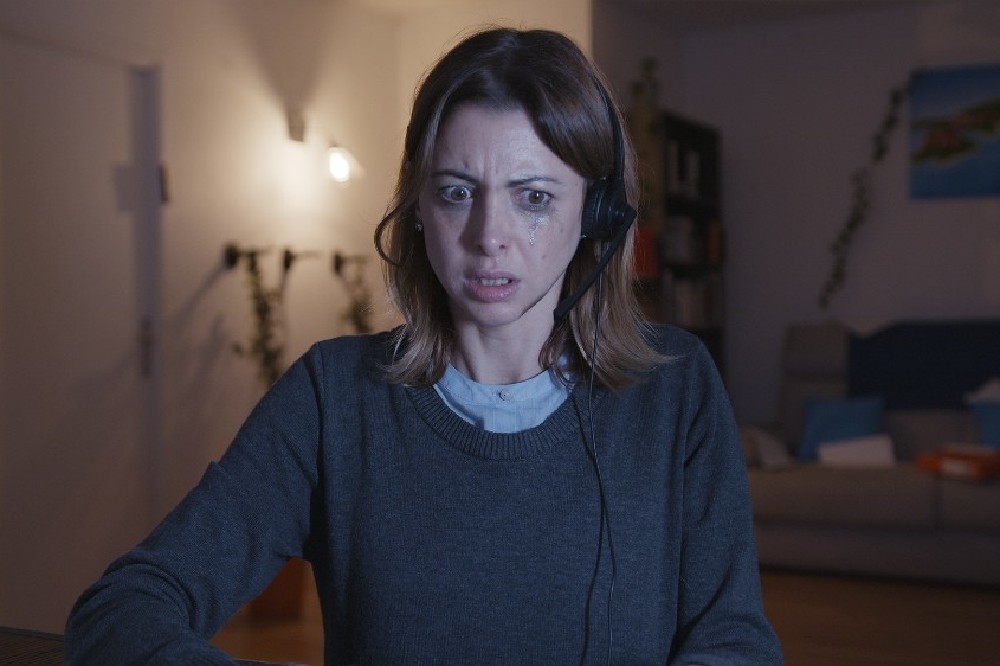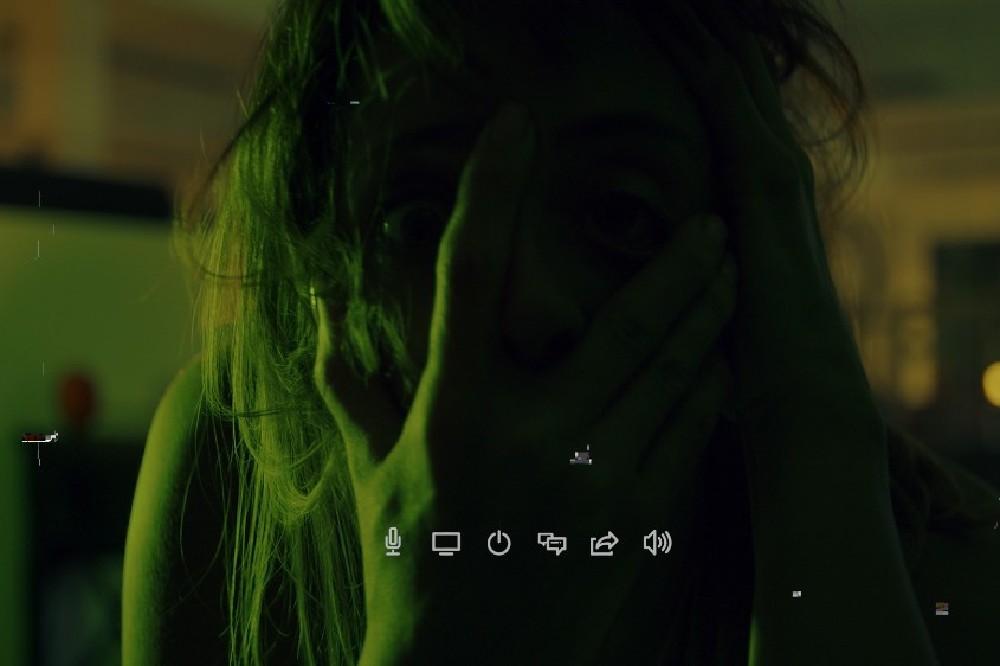An interactive movie allows you to control real-life people, and watch as your choices make deep ripples in a more real world; this concept is becoming more and more popular, and for good reason.

Night Book is available now on multiple platforms! / Picture Credit: Wales Interactive
Night Book is a new film from Wales Interactive, in which you can pick your own story, and decide what choices Loralyn (Julie Dray) makes.
We spoke with the director of this excellent feature, Alex Lightman, to better understand how Night Book works, and the creative process behind it.
What was the main challenge you faced when directing this unique feature?
With the whole project being shot remotely, every day there were new and unusual challenges to overcome. Fortunately for me the cast and crew were amazing and always approached any challenge with energy and enthusiasm.
One of the most challenging parts of the shoot was not being able to help people in the same way you would on a ‘normal’ set. As it was shot during lockdown, the actors were shipped all their equipment and props and had to set it all up themselves.
So if one of the actors was having a technical difficulty, or needed help putting up part of their set, then you felt a bit useless because you couldn’t just jump in give them a helping hand.
How did you go about directing the feature, given that you were never physically on-set?
Because we had very few shoot days and so much to cover, we scheduled in lots of rehearsal time whilst kit was travelling between locations. This was great because it meant there was time for the cast to get their heads around the unusual circumstances of the shoot before being under pressure on the shoot days.
It also meant that we were able to spend time building a team mentality that would have been more naturally created had we all been on set in person. I also realised very quickly that I had to be as patient and as supportive as possible to the cast.
Usually there would be the buzz of the crew giving the cast energy and an audience to feed on, but in this case they were all alone in their homes talking to their computers! Fortunately for me, I had a great cast, and they really took to the challenge of the format and made it what it is.
What challenges did you face when creating this interactive film?
Any film comes with its unique challenges. With this one it was the sheer complexity of the script. Without giving anything away, there are so many branches and routes that only happen if the player has chosen certain things early on, that keeping track of everything and making sure the continuity of performance worked was a level of mental gymnastics I’ve never had to do before.

The other major challenge was then how to approach the edit, which was vast and extremely complicated! Oh, and we decided to build an entire computer user interface too and tell some of the story through texts and instant messages. Our editor Alexandra Oliver and the entire post-production team were nothing short of heroic.
What did the casting process look like?
We watched lots and lots of self-tapes. Usually, I’m not a huge fan of self-tapes, but in this instance it was super helpful because of course the shoot itself was almost like the world’s most intense self-tape!
It was also really important to us that we cast people who were excited about the interactive format, and people who were up for the fact that this shoot was going to be super intense. There was no waiting in your trailer to be called for your next scene. The cast had to be the entire production so we needed people who were ready to get stuck in.
What was it like working with Colin Salmon and Julie Dray?
A privilege and an honour. Julie is the emotional powerhouse behind this entire story and just brought it with every single take. She spent the best part of three weeks alone in the dark, in her own home, pretending to be pregnant and being chased by evil spirits, all whilst being her own camera operator and art director! I still don’t entirely understand how she managed it.
And working with Colin was great. He was so passionate and excited about getting his hands dirty and making something new and exciting. His set was at the bottom of his garden and he must have spent days in dressing the set, gathering props from his own home to build Carl Vito’s hoarders office. It really was an honour to have such talented people working so hard for us.
How did the cast go about doing their own lighting, make-up and continuity?
Like any other film, we had a production designer (Zahra Mansouri) a costume designer (Chrissy Pegg) and a director of photography (Evan Zissimopulos) who were responsible for their various departments.
They would spend hours meticulously labelling everything that was sent to the cast, and then would sit on Zoom during a ‘setup’ day and guide the cast through setting up all their equipment. They would then be on standby on the call to jump in and troubleshoot any technical difficulties and tell the cast where they wanted to move the lights and what setting they wanted them on.

The camera itself had to be framed up by the cast, but Evan was actually able to operate the focus and the exposure remotely via the internet. Which was completely insane. The cast were pretty on top of it when it came to doing their makeup, and the continuity, well, that was a challenge.
Julie must have been a continuity person in another life because she somehow managed to keep everything in her head, but failing that, there would be long complicated conversations between myself and production, sometimes looking back over what we had shot previously, to make sure we got the continuity of all the branching narratives right.
Where did the inspiration for the story come from?
The writer Megan Jones came up with the story. She’s a devoted gamer with a background in languages, so she brought an awful lot of thought and authenticity to writing. There was of course the technical element of what we could shoot given the restrictions of how we had to shoot it. That played a role.
But also trying to push that as far as possible to tell the fullest story possible was really important to us. It was really fun developing the idea with her into the story we now have.
What was the creative process like when discussing the different choices/paths within the game?
It was really fascinating. When telling a linear story, the characters are constantly faced with making decisions. And it’s what decision the character makes that defines what kind of character they are. The difference of course is that the writer decides what choice the character is going to make, not the audience.
In this case, it was really exciting to think about what sort of choices these characters would take, and instead and choosing exactly which one we thought was right for the character, putting the choices on screen and letting the audience decide for themselves.

How did you decide when to present viewers with choices?
There’s a natural rhythm I think to any story. And from a craft point of view, a story is driven forward by the decisions made by the main characters. This meant that there was always going to be natural points in the story where Loralyn was going to have to make choices that dictated what happens next.
These were where we put forward our decision points. We wanted it to be that whenever there was a moment when the story could change based on Loralyn’s decision, the decision would be posed to the audience. In other words, choices had to matter. Every little thing you do in the game is going to have a knock-on effect later down the line.
What are you most excited for people to see when they play/watch Night Book?
I’m really excited for them to get to experience to different versions of the story. We really worked hard to make a game where, whatever route you take, you feel like you get a different, fully resolved (if not always happy!) ending. It should feel like a slightly different movie every time you play through.
Do you have any other projects coming up?
I can’t say anything specific, but what I can say is that since shooting Night Book I have been working on developing a number of projects with Good Gate Media and that exciting things are in the works!
Night Book is available now on Steam (PC & Mac), PS4, Xbox One, Nintendo Switch, and iOS.
RELATED: REVIEW: Night Book
Choosing your own story when playing a game is rather common, as you make choices that change the course of your game; sometimes it’s an obvious choice and other times you can’t be sure how certain events occurred. But to have this idea put into a movie is something else...
Tagged in Games

